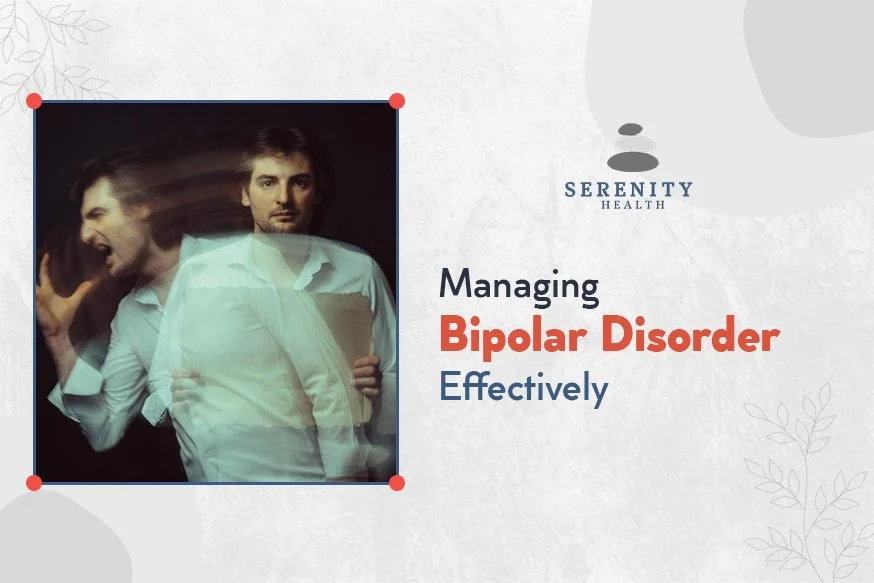Managing Bipolar Disorder Effectively
Your mind shifts between extremes. High energy days where everything feels possible, then low periods when getting out of bed takes effort.
This is bipolar disorder, and a lot people around the world navigate it daily.
The key isn't stopping these mood fluctuations entirely; rather, it is learning to ride them better.
Warning Signs
Every person's bipolar patterns look different. Some cycle quickly, whereas others have longer stretches between episodes. Your job is mapping your own territory.
Notice what happens right before mood changes
Track your sleep quality and the duration of sleep
Pay attention to any seasonal patterns
Watch for stress triggers
Make notes on your phone or on paper
Once you recognize your patterns, you are able to prepare, as opposed to react.
Related: Early Warning Signs of Mood Disorders and What You Can Do
Getting Medication Right
Finding effective medication takes time and honest conversation with your provider. What works for someone else might not work for you.
Tell your doctor or nurse practitioner about side effects
Don't skip doses or stop suddenly
Ask about genetic testing for better medication matches
Be patient, because some medications might need a few weeks to see results
Speak up if something isn't helping
Good psychiatric care means having a provider who adjusts treatment based on your personal experience.
Your Small Daily Habits
Stability comes from consistent, small choices. Think of these as your baseline.
Get up and go to asleep at approximately the same time each day, whenever possible
Eat nutritious meals
Move your body each day
Take breaks when you feel overwhelmed
Remain in contact with those who are important to you
These aren't cure-alls; rather, they create a foundation for treatment.
When to Reach Out
Self-management has limits. Sometimes you need professional help, and recognizing that moment is crucial.
Sleep gets severely disrupted for days
Work or personal relationships suffer repeatedly
You can't handle basic daily tasks
Dark thoughts become frequent
Nothing that usually helps is working
Getting support during tough periods prevents bigger crises later.
What Makes Serenity Health Stand Out
Finding the right psychiatric team changes everything about managing bipolar disorder. Serenity Health approaches mental health care differently than most places.
What sets us apart:
We see you as a complete person, not just symptoms
Evidence-based treatments customized to meet your specific needs
Telehealth options after your first in-person visit
GeneSight genetic testing to guide medication decisions
After-work appointments that work with real schedules
Convenient location in Carmel, Indiana
Our providers understand that effective bipolar treatment requires genuine partnership!
Build Your Support Circle
Isolation makes bipolar disorder harder to manage. The right people around you make a real difference.
Family members willing to learn about bipolar disorder
Friends who can have honest conversations about mental health
Support groups with people who understand firsthand
Therapists with experience treating mood disorders
You need people who get it.
Next Steps
The proper assistance of professional, personal treatment, along with people who realize what you are going through, are the keys to managing bipolar disorder successfully.
Serenity Health cares about you as an individual. Our telehealth services ensure continuity in care, even in hard times.
We understand that effective bipolar management requires flexibility, patience, and cooperation between you and your treatment team.
Contact us at Serenity Health today! Learn how we can help you find better balance and live more confidently.
FAQs
How long does it really take to find the right medication?
Usually, several months of working closely with your psychiatrist or psychiatric mental health nurse practitioner. Each person reacts to different medications differently. Patience is key.
Can I have a normal life with bipolar disorder?
Yes! There are numerous successful individuals with bipolar disorder whose careers, relationships, and individual ambitions are gratifying. Effective care makes a big difference.
Do I even need therapy if I take medication?
Medication assists with stabilizing moods, whereas therapy provides you with tools and skills. Both are advantageous to most people.

